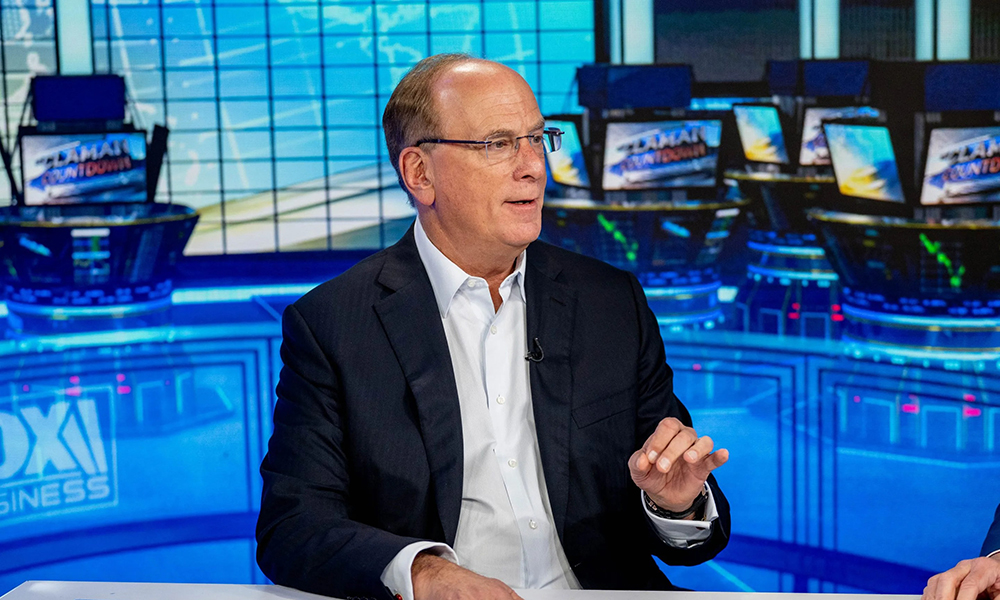
隨著對經(jīng)濟衰退的恐慌令市場陷入動蕩,兩家華爾街大公司的負責人卻給出了相互矛盾的信號,。
高盛(Goldman Sachs)首席執(zhí)行官蘇德巍發(fā)出了危機警告,,呼吁人們?yōu)楦鼑乐氐耐ㄘ浥蛎浐推仍诿冀薜慕?jīng)濟衰退做好準備。
蘇德巍在接受CNN主播波比·哈羅采訪時表示,,人們應(yīng)該開始為更高通脹環(huán)境做準備,,并且“我們很有可能尚未達到通脹的最高峰?!?/p>
蘇德巍表示,,美國陷入經(jīng)濟衰退的幾率很高,尤其是經(jīng)過今年的三次大規(guī)模加息之后,。他表示:“每次高通脹遇上經(jīng)濟緊縮,,最終都會陷入某種形式的經(jīng)濟衰退。”
雖然蘇德巍對經(jīng)濟狀況發(fā)出警告,,但貝萊德(BlackRock)CEO拉里·芬克的觀點卻截然相反,。他認為目前擾動市場的經(jīng)濟困境對于長期投資者而言是“正常現(xiàn)象”,。
芬克周三參加CNBC的吉姆·克拉默主持的《Mad Money》節(jié)目時表示:“有一位名人給我打電話,,慌慌張張地說:‘我該怎么辦,我得變現(xiàn)逃命,,受不了了,,受不了了?!艺f:‘去度個假吧,。’”
他告訴對方:“如果你無法承受壓力,,那就賣掉……但事實上,,對這種情況我們并不陌生。通脹問題隨著時間推移會得到解決,。我們看到大宗商品價格已經(jīng)從高位下跌,。”
在被問到持續(xù)通脹,、美聯(lián)儲可能的加息和俄烏沖突,,是否威脅美國經(jīng)濟的健康時,芬克表示,,這些問題都是“可以解決的”,,而且即使在動蕩時期需求依舊沒有變化。
他說道:“美聯(lián)儲的工具是收緊貨幣供應(yīng),,這樣一來就會限制需求,。所以會有經(jīng)濟衰退風險?確實如此,。但即使我們陷入衰退,,嚴重程度也相當輕微。美國的財務(wù)基礎(chǔ)一直非常穩(wěn)固,?!?
通貨膨脹:根深蒂固還是轉(zhuǎn)瞬即逝?
雖然芬克非常樂觀,,但在6月消費物價指數(shù)漲幅超過9.1%的消息傳出后,市場因為恐慌出現(xiàn)波動,,因為這意味著美聯(lián)儲可能在本月再次進行大規(guī)模加息,。
芬克表示:“我們需要明白。我們的通脹水平確實居高不下。它很大程度上是政策造成的,?!必惾R德CEO一直認為,出于民族主義的政策,,例如迫使美國產(chǎn)業(yè)在國內(nèi)生產(chǎn)商品和收緊對合法移民的限制等,,使通脹進一步惡化。
但他認為,,盡管物價上漲,,基本需求依舊沒有改變,而且供應(yīng)情況正在好轉(zhuǎn),。芬克表示,,大宗商品價格從年初開始持續(xù)下跌,而一度陷入混亂的供應(yīng)鏈,,隨著全球擺脫疫情的影響,,也在不斷好轉(zhuǎn)。
銅,、木材等大宗商品的價格在2021年暴漲,,但從年初以來已經(jīng)分別下跌了21%和41%。在俄烏沖突爆發(fā)后,,原油價格一度暴漲至每桶140美元以上,。但隨著交易商擔心經(jīng)濟衰退可能導(dǎo)致需求減少,原油價格也開始穩(wěn)步下降,。
然而,,高盛的蘇德巍卻認為通脹很難回落。他表示,,通貨膨脹“絕不會是暫時現(xiàn)象”,,可能會長期持續(xù)下去。蘇德巍曾在周一召開的高盛第二季度營收電話會議上對投資者表示,,通貨膨脹是美國經(jīng)濟根深蒂固的問題,,在下半年不太可能下降。
蘇德巍在采訪的最后提出了警告,。他說道:“我無法預(yù)測未來六個月世界將會是什么樣子,。如果情況變得更加艱難,我們需要做好相應(yīng)的調(diào)整,。在進行這些預(yù)測的時候,,我們總是會努力保持高度敏捷?!保ㄘ敻恢形木W(wǎng))
翻譯:劉進龍
審校:汪皓
隨著對經(jīng)濟衰退的恐慌令市場陷入動蕩,,兩家華爾街大公司的負責人卻給出了相互矛盾的信號,。
高盛(Goldman Sachs)首席執(zhí)行官蘇德巍發(fā)出了危機警告,呼吁人們?yōu)楦鼑乐氐耐ㄘ浥蛎浐推仍诿冀薜慕?jīng)濟衰退做好準備,。
蘇德巍在接受CNN主播波比·哈羅采訪時表示,,人們應(yīng)該開始為更高通脹環(huán)境做準備,并且“我們很有可能尚未達到通脹的最高峰,?!?/p>
蘇德巍表示,美國陷入經(jīng)濟衰退的幾率很高,,尤其是經(jīng)過今年的三次大規(guī)模加息之后,。他表示:“每次高通脹遇上經(jīng)濟緊縮,最終都會陷入某種形式的經(jīng)濟衰退,?!?/p>
雖然蘇德巍對經(jīng)濟狀況發(fā)出警告,但貝萊德(BlackRock)CEO拉里·芬克的觀點卻截然相反,。他認為目前擾動市場的經(jīng)濟困境對于長期投資者而言是“正?,F(xiàn)象”。
芬克周三參加CNBC的吉姆·克拉默主持的《Mad Money》節(jié)目時表示:“有一位名人給我打電話,,慌慌張張地說:‘我該怎么辦,,我得變現(xiàn)逃命,受不了了,,受不了了,。’我說:‘去度個假吧,?!?/p>
他告訴對方:“如果你無法承受壓力,那就賣掉……但事實上,,對這種情況我們并不陌生,。通脹問題隨著時間推移會得到解決。我們看到大宗商品價格已經(jīng)從高位下跌,?!?/p>
在被問到持續(xù)通脹、美聯(lián)儲可能的加息和俄烏沖突,,是否威脅美國經(jīng)濟的健康時,,芬克表示,這些問題都是“可以解決的”,,而且即使在動蕩時期需求依舊沒有變化,。
他說道:“美聯(lián)儲的工具是收緊貨幣供應(yīng),這樣一來就會限制需求,。所以會有經(jīng)濟衰退風險,?確實如此,。但即使我們陷入衰退,嚴重程度也相當輕微,。美國的財務(wù)基礎(chǔ)一直非常穩(wěn)固?!?
通貨膨脹:根深蒂固還是轉(zhuǎn)瞬即逝,?
雖然芬克非常樂觀,但在6月消費物價指數(shù)漲幅超過9.1%的消息傳出后,,市場因為恐慌出現(xiàn)波動,,因為這意味著美聯(lián)儲可能在本月再次進行大規(guī)模加息。
芬克表示:“我們需要明白,。我們的通脹水平確實居高不下,。它很大程度上是政策造成的?!必惾R德CEO一直認為,,出于民族主義的政策,例如迫使美國產(chǎn)業(yè)在國內(nèi)生產(chǎn)商品和收緊對合法移民的限制等,,使通脹進一步惡化,。
但他認為,盡管物價上漲,,基本需求依舊沒有改變,,而且供應(yīng)情況正在好轉(zhuǎn)。芬克表示,,大宗商品價格從年初開始持續(xù)下跌,,而一度陷入混亂的供應(yīng)鏈,隨著全球擺脫疫情的影響,,也在不斷好轉(zhuǎn),。
銅、木材等大宗商品的價格在2021年暴漲,,但從年初以來已經(jīng)分別下跌了21%和41%,。在俄烏沖突爆發(fā)后,原油價格一度暴漲至每桶140美元以上,。但隨著交易商擔心經(jīng)濟衰退可能導(dǎo)致需求減少,,原油價格也開始穩(wěn)步下降。
然而,,高盛的蘇德巍卻認為通脹很難回落,。他表示,通貨膨脹“絕不會是暫時現(xiàn)象”,,可能會長期持續(xù)下去,。蘇德巍曾在周一召開的高盛第二季度營收電話會議上對投資者表示,,通貨膨脹是美國經(jīng)濟根深蒂固的問題,在下半年不太可能下降,。
蘇德巍在采訪的最后提出了警告,。他說道:“我無法預(yù)測未來六個月世界將會是什么樣子。如果情況變得更加艱難,,我們需要做好相應(yīng)的調(diào)整,。在進行這些預(yù)測的時候,我們總是會努力保持高度敏捷,?!保ㄘ敻恢形木W(wǎng))
翻譯:劉進龍
審校:汪皓
As recession fears stalk markets, the heads of two Wall Street behemoths are giving off contradictory signals.
Goldman Sachs chief executive David Solomon is warning of trouble ahead, urging people to prepare for worsening inflation and an approaching recession.
Solomon, speaking to CNN's Poppy Harlow, said people should begin preparing for an environment of higher inflation, adding, "there's a good chance that we haven't quite reached the peak yet."
The odds of a recession are high, especially after the three outsized rate hikes seen this year, Solomon said, noting, "anytime you have high inflation and go through an economic tightening, you wind up having some sort of an economic slowdown."
But as Solomon flashes warning signs about the state of the economy, BlackRock CEO Larry Fink is taking a very different tack—calling the economic headwinds currently roiling markets “business as usual” for long-term investors.
Speaking on CNBC’s Jim Cramer's Mad Money on Wednesday, Fink said, “A really famous person called me up, panicking, ‘what should I do, I’ve got to get out, I can’t stand it, I can’t stand it.’ And I said, ‘go on vacation.’”
He recounted telling the person, “If you really can’t stand it, then sell it… But the reality is, we’ve seen this. Inflation is going to be fixed over time. We're already seeing commodity prices crashing from the highs," he said.
When asked if persistent inflation, a likely increase in the Fed rate, and the Ukraine war were a threat to the health of the U.S. economy, Fink indicated that these were all "fixable" and that demand has remained unchanged throughout the turmoil.
"The Federal Reserve's tool is to tighten, and through tightening they limit demand. So is there a risk of a recession? Sure there is. And even if we're in one, it's going to be quite mild. The financial foundation of America is as strong today as ever." he said.
Inflation: entrenched or transitory?
Despite Fink's rosy outlook, markets are moving with trepidation after the consumer price index shot up more than 9.1% for the month of June, signaling the Fed may be on track for another big interest hike this month.
"Let's be clear. We do have really elevated inflation. A lot of it is policy generated," Fink said. The BlackRock CEO has long argued that nationalistic policy-making, like the push to make U.S. industry produce goods domestically and the tightening of legal immigration, has made inflation worse.
But Fink argues that despite rising prices, underlying demand has stayed unchanged and supply is improving. Fink argues commodity prices have dropped since the start of the year and supply chains, which were snarled as the world exited the global pandemic, have improved.
Commodities like copper and lumber, which both soared in 2021, have dropped by 21% and 41% since the start of the year. Even crude oil, which shot above $140 a barrel after the war in Ukraine broke out, has been steadily dropping as traders fear a recession might bring on demand destruction.
However, Goldman Sach’s Solomon doesn't see inflation coming back down. Solomon said inflation is "definitely not transitory" and is here to stay. Solomon previously said on Goldman’s second-quarter earnings call with investors on Monday that inflation is entrenched in the economy and it may not come down in the second half of the year.
Solomon ended the interview with caution. "I can't tell you what the world's going to look like in six months. If the world looks more difficult, we'll adjust accordingly. We always try to be extremely nimble in how we think about these things," he said.






